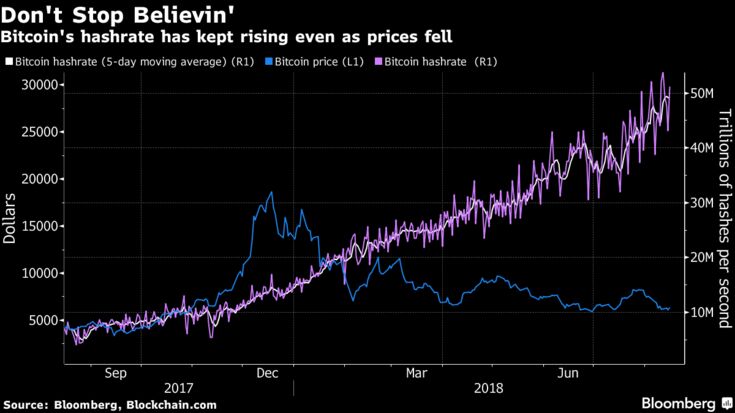With Bitcoin declining this year, you might expect mining activity to follow. That hasn’t happened.
The combination of falling prices and a rising hash rate -- which measures computing power -- shows how complex the economics of cryptocurrency mining are. An increasing hash rate means Bitcoin mining is still profitable enough for many players to stay put, defying speculation that prices have fallen past break-even points.

Source: https://www.bloomberg.com/news/articles/2018-08-16/with-bitcoin-sinking-cryptocurrency-miners-just-dig-deeper
That may be a reflection of how sophisticated Bitcoin mining has become after last year’s 1,400 percent price rally. While that drew a fair share of amateurs mining from their basements, the lucrative rewards also drove major miners to up their game by snatching up increasingly speedy chips and setting up shop in places with cheap power. That’s helped them squeeze out smaller players as prices fall to the $6,000 level.
“There are still major expansions happening, especially from more efficient miners,” Marco Streng, chief executive officer of Genesis Mining, said by phone from London. “The expansion is so big that it compensated for the drop-out of not-so-efficient miners.”
New Bitcoins are created when computers compete to process transactions by solving complex puzzles in exchange for tokens. As mining power increases, the calculations needed to generate new digital coins become harder -- a mechanism designed to limit supply and dominance in the hands of few miners.
The race to get ahead with top-notch technology has intensified so much that miners became key customers for semiconductor giants such as Nvidia Corp. and Taiwan Semiconductor Manufacturing Co. And because of such advantages, the business became increasingly institutionalized and concentrated in the hands of companies like Bitmain or Bitfury.
While faster gains in the hash rate have coincided with price rallies in the past, the relationship between the two isn’t so straightforward. Theoretically, a climbing hash rate should lift the price because it means the cost of each token is higher. But computing power may be rising now because of past expansions in capacity, which are a sunk cost to miners and reflect higher prices earlier. It’s also possible that miners will sell more of their holdings as margins get squeezed.
“The increased hash rate means people are here for the long-term because they’re happy to just accumulate what they have, potentially even run at a loss,” said David Sapper, chief operating officer at cryptocurrency exchange Blockbid Pty Ltd. in Melbourne. At the same time, “they do sometimes have to clear house and dump.”
Various analysts have have tried to calculate the break-even price for miners, which may offer support for prices. Bullish research firm Fundstrat Global Advisors has estimated$8,000. Morgan Stanley has said that large mining farms make money only with Bitcoin trading above $8,600, according to a CNBC report. Researchers at CoinShares, which offers cryptocurrency investment products, estimated in a May report the average marginal cost of a Bitcoin is $6,400. The digital currency traded at about $6,500 on Friday.
The number varies depending on the miner’s efficiency. Genesis Mining, for instance, is still expanding capacity, Streng said. Miners that also manufacture equipment have the benefit of immediate and cheaper access to their hardware and can adjust prices of their products to maximize profits, according to the CoinShares report.
Yet it’s clear the heydey of cryptocurrency mining is over for now. Genesis Mining said Thursday it will terminate contracts that are mining too little to cover the daily maintenance fee. Semiconductor companies are also seeing a slowdown in demand from miners. Increasingly, cryptocurrency mining seems dominated by large, competitive companies.
“The efficiency of the hardware is rapidly increasing and costs are coming down,” the CoinShares researchers Christopher Bendiksen and Samuel Gibbons wrote. “Miners are securing access to highly competitive sources of electricity, often ones that would otherwise lie idle, and show high degrees of mobility.”
— With assistance by Todd White
Source : https://www.bloomberg.com/news/articles/2018-08-16/with-bitcoin-sinking-cryptocurrency-miners-just-dig-deeper
Comments
Post a Comment